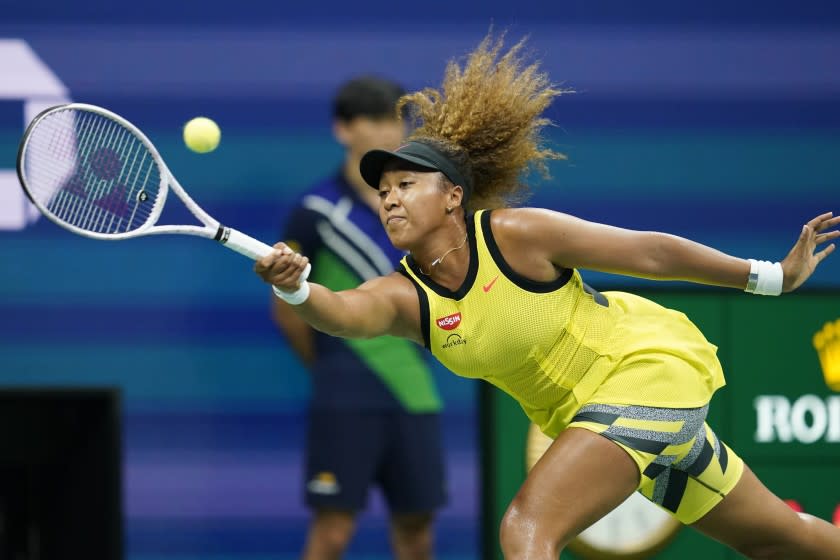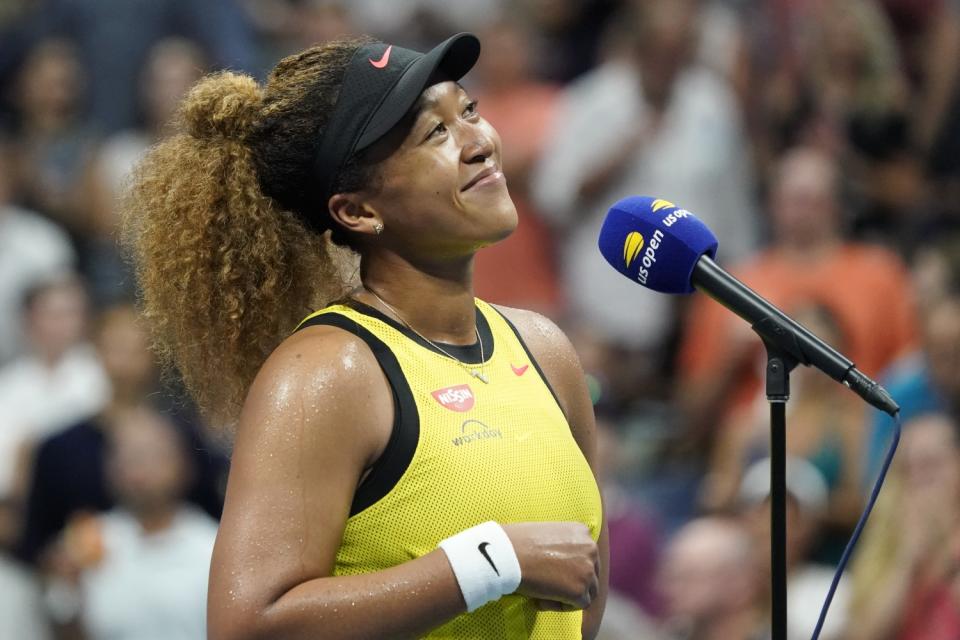Elliott: Naomi Osaka triumphant in return to U.S. Open, inspires special moment with young fan

- Oops!Something went wrong.Please try again later.
- Oops!Something went wrong.Please try again later.
Naomi Osaka is still finding her way forward as she sheds the doubts that had crept into her soul and jeopardized her mental well-being. Opening defense of her U.S. Open title with a 6-4, 6-1 victory over Marie Bouzkova of the Czech Republic on Monday was one small step on that continuing journey.
Osaka is not whole or wholly healed yet. What took years to bring her down can’t be erased in days or weeks. But she’s now looking toward the light, not the darkness that had been bringing her down.
“This tournament, I just want to be happy knowing I did my best,” she said Monday. “I told myself that if I performed well, the outcome, win or lose, would be OK.”
In the past, when others saw her earn a convincing victory on the tennis court, the 23-year-old native of Japan saw opportunities to have played better. When others saw a powerful and confident athlete, she saw someone who failed to meet a near-impossible standard.
“I tell people that I’m a perfectionist. I think for me something that’s less than perfection, even though it might be something great, is a disappointment,” she said. “I don’t really think that’s a healthy way of thinking. So, something that I really wanted to change.”
Media questions about her losses or mistakes became magnified in her mind. As an introvert, she decided it would be better to skip required post-match news conferences and pay a fine if that meant avoiding questions that brought up her weaknesses on clay courts or the errors she made in a defeat. Those questions generally were mild, often sympathetic, but she saw the worst kernel in each inquiry. Being limited to conducting interviews via Zoom, which didn’t allow her to read facial expressions and body language, made the problems worse. They stacked up to form an imaginary, teetering pile, contributing to the bouts of depression she disclosed she had been battling since she upset Serena Williams to win the 2018 U.S. Open women’s title.
A four-time Grand Slam singles champion, Osaka put self-healing above competing at Wimbledon this year. What can’t be quantified is the number of conversations she started about the importance of mental health, and how even the most physically strong athletes sometimes need emotional aid. She helped make it OK to say you’re not OK, a precious gift. The U.S. Tennis Assn. has acknowledged the importance of her message by adding a mental health consultant to its staff.
Her year has been turbulent since she won the Australian Open, and she hasn’t gotten as far as the quarterfinals of a tournament since March at Miami. Overpowering Bouzkova on Monday was reassuring to her; a good night’s work. She turned up the power and the intensity in the second set, deflating Bouzkova’s spirit by ripping backhand after backhand to unreachable spots. Osaka won eight of the last nine games and never allowed her serve to be broken.

But the real win for Osaka came in giving a young girl sitting at courtside a souvenir pin from the Tokyo Olympics, where Osaka had lighted the Olympic cauldron during the opening ceremony. She hadn’t lasted long in the Olympic tennis tournament, Osaka joked in a typically self-deprecating moment during an on-court interview after Monday’s match, so she didn’t have much time to trade pins with other athletes. So she brought a bunch of pins home and gave one to the little fan who had been cheering for her.
It was genuine and thoughtful, her way of sharing the happiness she seems more determined to find.
In an Instagram post Sunday, Osaka said she had been reflecting over the last year, trying to figure out why she has felt so inadequate.
“I realize one of the reasons is because internally, I think I’m never good enough. I’ve never told myself that I’ve done a good job but I do know I constantly tell myself that I suck or I could do better,” she wrote. “Every time a new opportunity arises my first thought is, ‘Wow, why me?’”
The remedy, she concluded, is to seek the good in herself and in life and not emphasize the negative. Good advice for us all.
“I guess what I’m trying to say is that I’m gonna try to celebrate myself and my accomplishments more. I think we all should,” she wrote. “You got up in the morning and didn’t procrastinate on something? Champion. Figured something out at work that’s been bugging you for a while? Absolute legend. Your life is your own and you shouldn’t value yourself on other people’s standards. I know I give my heart to everything I can and if that’s not good enough for some then my apologies but I can’t burden myself with those expectations anymore. Seeing everything that’s going on in the world I feel like if I wake up in the morning that’s a win. That’s how I’m coming.”
She enjoyed playing before a crowd Monday, calling it surreal after so many months.
“It’s definitely relieving to win this match in two sets instead of three,” she said.
She also said her approach of accentuating the positive isn’t merely tennis philosophy. She’s also learning to accept compliments, which she used to brush off and insist she wasn’t worthy of receiving.
“I hope that I can keep this mind-set throughout my life,” she said. If that banishes the darkness for her and for others, that’s the biggest win she will earn this year, or any other.
This story originally appeared in Los Angeles Times.

